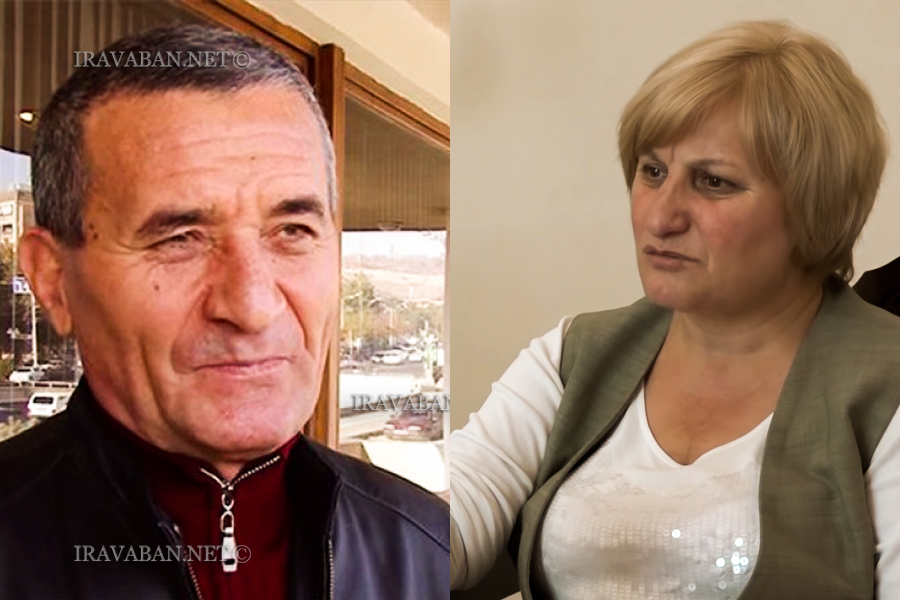On 25 November, the Court of General Jurisdiction of Yerevan decided to acquit Mushegh Saghatelyan sentenced in 1 March case. The session was presided over by Judge Mesrop Makyan.
In the interview with Iravaban.net Mushegh Saghatelyan’s attorney Seda Safaryan noted that unfortunately, her client has serious health problems and cannot share joy with others.
“I have heard that a number of similar cases are going to bring complaints and be reviewed because there should be an equal condition for everyone. If one is unable to take action on his own, the prosecution should seek to review those acts. By the way, there are people who are dead, and I know their cases are being reviewed too. This is a process of cleansing a part of the general population who have experienced both unfair judicial acts, isolation, and power in 2008, and their being alienated for society all these years because of opposition in society. It was difficult to live up to the revolution,” Seda Safaryan said.
According to the lawyer, Mushegh Saghatelyan’s case was a precedent. And the violations recognized by the European Court of Human Rights mostly apply to other persons.
Earlier, speaking to us Seda Safaryan said:
“Mushegh Saghatelyan is one of those persons, whom Robert Kocharyan personally took revenge on and executed. Mushegh Saghatelyan and his sons have said this many times. It is at least a proven fact that the prosecution of Mushegh Saghatelyan has been imitating for ten years,” says Seda Safaryan, lawyer of Mushegh Saghatelyan, who was injured during the 1 March 2008 events, referring to the reopening of his criminal case.
Seda Safaryan noted that in the Saghatelyan case, the European Court of Human Rights has identified five violations, which are fundamental functions and are mainly attributed to the court and law enforcement agencies. “It has been noted in the Mushegh Saghatelyan case that political persecution was much more visible and we had three judicial instances, which in essence did not exercise judicial power. This shows that Mushegh Saghatelyan’s case was the evaluation of the co-operation of the authorities and the judiciary of entire 1 March case, and thus the assessment is very conclusive,” the lawyer notes.
According to her, even if other cases are not heard or go to the ECHR, this case is enough to record what happened in the judicial system.
“Mushegh Saghatelyan knows most of what has happened in Armenia,” Seda Safaryan emphasized.
In addition, the Court of Cassation upheld the entirety the RA Prosecutor General’s appeal (including the appeals of attorneys S. Safaryan and V. Grigoryan partially) to review the under the new circumstances the judicial acts of the Yerevan Criminal Court and the RA Criminal Court of Appeal made in 2008- 2009 that refer to Mushegh Sagahtelyan, participant of March 2008 events and overturned and remitted them, sending the case to the Yerevan Court of First Instance for a new hearing.
Notably, by the verdict of 23 October, 2008, Mushegh Saghatelyan was found guilty under Article 235 part 4, Article 316 part 1 and Article 316 past 2 and was fined and sentenced to five years in prison.
Mushegh Saghatelyan was charged with the fact that participating mass public events in Yerevan in 2008 after the presidential election, in the morning on 1 March, 2008, at Liberty Square and later on Arshakunyats Avenue, disobeying the lawful demands of police officers, he by pushing, pulling and striking them caused non-life threatening violence and attempted escape. He was also charged with carrying a factory-made knife which was a civilian cutting weapon.
Saghatelyan’s lawyer appealed the 10 December, 2008 verdict to the RA Criminal Court of Appeal, which was rejected. And in 2009 by the decision of 10 March 2009, the Court of Cassation of the Republic of Armenia dismissed the cassation appeal filed by the defense without examination.
On 20 September 20, 2018, the European Court of Human Rights in the case of Mushegh Saghatelyan v. the Republic of Armenia registered a verdict on the aforementioned criminal case had recorded violation of the rights provided in several articles of the European Convention on Human Rights (prohibition of torture, liberty and security of person, fair trial, freedom of assembly and association). The ECHR decision entered into force on 20 December, 2018, which, the RA Prosecutor General considered as a new circumstance, and based on it filed a cassation appeal.
Details of Mushegh Saghatelyan’s case, as well as the ECHR judgment, are provided here.
Alisa Chilingaryan















